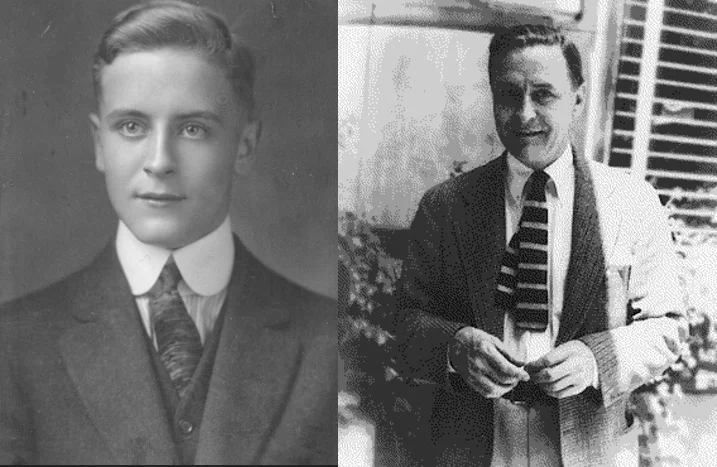F. Scott Fitzgerald's Prescient 'Crack-Up'
"Warts and all," today's ubiquitous euphemism for psychological turmoil in celebrity memoirs, are what F. Scott Fitzgerald instead called The Crack-Up in 1936, the titular piece in a series of confessional essays that did not gain any sort of critical acclaim or significant revenue until after his death. Fitzgerald’s Crack-Up is perhaps the best place to examine after Beers precisely because the true confessional literary memoir Fitzgerald seeks to write is still forbidden to him. The circumstances surrounding Fitzgerald's Crack-Up are important to understand not only for the context of the narrative, but also because of how inverted their relationship to the result of the confession is. That is to say, where today's memoirists are able to succeed in confessing to their past mental health problems—whether in notoriety, sheer income, and latent influence—Fitzgerald fails in all but one. The Crack-Up effectively ended Fitzgerald's career as a writer (Du Bois, New York Times, July 23, 1945 [Books of the Times]), prevented him from attaining contracts for future projects, and yet somehow resulted in some of his most memorable quotes—and, arguably greatly influenced later memoirists, such as Styron, who would have been aware of this later writing of Fitzgerald's by the time he reached a canonical status.
Fitzgerald's celebrity as a novelist during his prime was perhaps unparalleled to that of any other author in American history, with the closest comparisons now being hip hop or movie stars. Of course now most American high schoolers read The Great Gatsby in high school or college, while many may have also seen the film adaptation with Leonardo DiCaprio, keeping Fitzgerald a household name in the 21st Century. Yet just as Fitzgerald's peak fame was perhaps unparalleled as a novelist, so too was his fall.
By the time Fitzgerald was writing The Crack-Up in the mid 30s, it had been about a decade since the apex of his fame. His beloved Zelda had been separated from him and would end up dying seven years after him in a mental institution in Asheville, North Carolina, diagnosed with manic depression. Fitzgerald himself was holed up in a hotel room in West Hollywood, drinking himself to death while working as a fledgling screenwriter. He had gained weight and lost his charm, all while fading away from the public consciousness during the Great Depression as his fame withered.
Instead of confessing to being a depressed alcoholic, Fitzgerald presents his crisis, like Beers, in existential terms. From the first sentence, he presents his breakdown as inherently existential and establishes the barriers preventing him from making a complete confession.
“Of course all life is a process of breaking down, but the blows that do the dramatic side of the work—the big sudden blows that come, or seem to come, from outside—the ones you remember and blame things on and, in moments of weakness, tell your friends about, don't show their effect all at once,” Fitzgerald wrote in the February 1936 issue of Esquire.
After positing “blows” that he can tell his friends about, Fitzgerald puts forth something more profound that he cannot quite adequately describe without a diagnostic vocabulary.
“There is another sort of blow that comes from within—that you don't feel until it's too late to do anything about it, until you realize with finality that in some regard you will never be as good a man again. The first sort of breakage seems to happen quick—the second kind happens almost without your knowing it but is realized suddenly indeed,” Fitzgerald wrote.
Here, Fitzgerald tries to capture the true internal turmoil he's experiencing: a feeling that he has now peaked and reached a point of no return not just in his career, but his whole life. To a modern reader, and even a contemporary one for Fitzgerald, it's unclear what exactly Fitzgerald is talking about in the first few paragraphs. The Crack-Up reveals precisely the struggle one faces in trying to convey such an intimate and interior experience, one that is dependent on the mind yet simultaneously impeded by it when it must be described.
Although a scientific narrative in the realm of "chemical imbalance" may have let Fitzgerald abdicate his responsibility to manage his problems, that unexplored frontier coupled with a heavy social stigma at the time—one that would remain particularly strong for men to the point that it was almost the same one Styron would end up facing—leaves Fitzgerald in an uncomfortable place as a narrator. So, instead, he identifies something within—something he cannot explicitly name because of the social and vocabulary restrictions of his time— that is what truly bothers and perplexes him.
The fundamental conflict between the internal and the external torments Fitzgerald throughout the essay, intensified by his difficulty with describing his internal state of madness. Perhaps that is what he is trying to get at when he sets up a sort of dialectic that turns into one of his most famous quotes, which can be seen in places ranging from inspirational posters to the Forbes homepage.
“The test of a first-rate intelligence is the ability to hold two opposed ideas in the mind at the same time, and still retain the ability to function,” Fitzgerald wrote.
Fitzgerald may fail his own test of a “first-rate intelligence,” unable to take this opposition to a higher plane in his essay. Instead, he meanders to various poorly lit corners of his mind, such as regretting his inability to cut it as a college football player or not being able to go to war overseas. Much like Styron does later—and still later, Jamison and Morris—Fitzgerald uses an abstracted and rather poetic buildup to get to the true subject of his essay, in this instance, in the form of a kicker that shows how he has fallen from his peak fame, talent, and charm.
"As the Twenties passed, with my own twenties marching a little ahead of them, my two juvenile regrets—at not being big enough (or good enough) to play football in college, and at not getting overseas during the war—resolved themselves into childish waking dreams of imaginary heroism that were good enough to go to sleep on in restless nights. The big problems of life seemed to solve themselves, and if the business of fixing them was difficult, it made one too tired to think of more general problems.
Life, ten years ago, was largely a personal matter. I must hold in balance the sense of futility of effort and the sense of the necessity to struggle; the conviction of the inevitability of failure and still the determination to "succeed"—and, more than these, the contradiction between the dead hand of the past and the high intentions of the future. If I could do this through the common ills—domestic, professional, and personal—then the ego would continue as an arrow shot from nothingness to nothingness with such force that only gravity would bring it to earth at last.
For seventeen years, with a year of deliberate loafing and resting out in the center—things went on like that, with a new chore only a nice prospect for the next day. I was living hard, too, but: 'Up to forty-nine it'll be all right,' I said. 'I can count on that. For a man who's lived as I have, that's all you could ask.'
—And then, ten years this side of forty-nine, I suddenly realized I had prematurely cracked," Fitzgerald wrote.
While it may still seem unclear as to what exactly Fitzgerald is talking about, in a similar way to Styron and most authors who want to convey the seriousness of mental illness, Fitzgerald introduces a morbidity to his confessional essay that raises the stakes. A mysterious doctor is mentioned later on, as well as the word "alcoholism" in reference to another man, but Fitzgerald largely keeps his self-reflection outside of the realm of the medical and instead in a more nihilistic milieu.
Fitzgerald ultimately meanders and digresses, providing some diagnostic analysis as best he can, but with little prescriptive insight. One last interesting passage, however, comes when he quite explicitly outlines symptoms of depression that jump off the page today.
"But I had a strong sudden instinct that I must be alone. I didn't want to see any people at all. I had seen so many people all my life—I was an average mixer, but more than average in a tendency to identify myself, my ideas, my destiny, with those of all classes that came in contact with. I was always saving or being saved—in a single morning I would go through the emotions ascribable to Wellington at Waterloo. I lived in a world of inscrutable hostiles and inalienable friends and supporters.
But now I wanted to be absolutely alone and so arranged a certain insulation from ordinary cares," Fitzgerald wrote.
The desire for isolation, a lack of care for things once held dear, and a loss of identity are all textbook symptoms of depression—only for Fitzgerald, there was no textbook. Within the parameters that Fitzgerald establishes for himself lies the literary memoir of mental illness, wherein one engages with trauma and severe—sometimes deadly—symptoms that have been taboo to discuss publicly for most of history. Fitzgerald’s account is made all the more interesting by the extreme swing toward the glorification of symptoms and “coming out” that is seen in certain circles some 80 years later. Much like Beers, Fitzgerald is feeling around in the dark, unknowingly creating norms and techniques in a genre that is forbidden to him, and one that his dabbling in will ultimately end his career.

